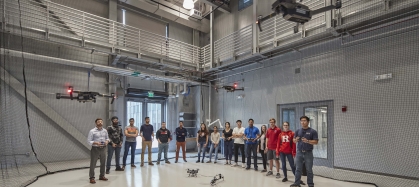Emil Buehler Aerospace Lab

The Emil Buehler Aerospace Lab is a two-story testing space for drones and aerospace projects. The School of Engineering has a number of faculty advancing drone-related research.
Xiaoli Bai (MAE): Modeling, control, and analysis of next generation air transportation system; space situation awareness and next generation space catalog problems; dynamics, control, and optimization for space systems and aerospace systems.
Onur Bilgen (MAE): Conceptual design, modeling/simulation, optimization, control, manufacturing and testing/validation of smart-material based multi-physics systems. Piezoelectric materials and shape-memory alloys are among the materials that are studied. Applications include aircraft systems such as multi-rotor drones, fixed-wing, flapping-wing and rotary-wing aircraft, energy-conversion and harvesting systems, soft/compliant robotics, manipulators and biomechanical systems, and mobile biomedical devices.
Laurent Burlion (MAE): Nonlinear control systems, safe control of UAVs, spacecraft attitude control, flight control and protection.
F. Javier Diez-Garias (MAE): Experimental thermal and fluid sciences, fire safety, sprays, microfluidics, flow diagnostics, turbulence, combustion, and energy.
Emil Buehler was an aviation visionary, architect, and engineer dedicated to advancing aircraft travel. His accomplishments include reconfiguring a twin-engine Piper aircraft to allow higher speed, operating a school of aeronautics at New Jersey’s Teterboro Airport, supervising the construction of the Fort Lauderdale Executive Airport, and funding the construction of a supersonic wind tunnel.